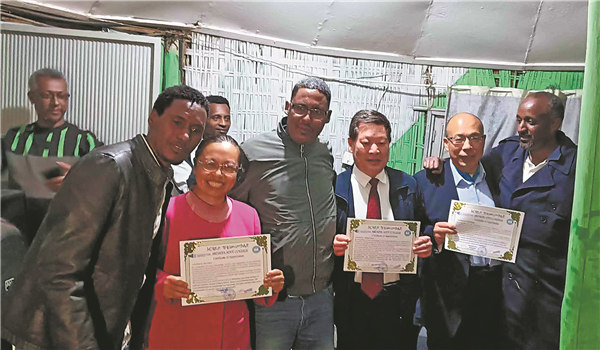Courtyard gardens and cocoons


Silk and small-scale farming initiatives part of couple's efforts to boost agriculture in Ethiopia, Wang Qian and Zhu Xingxin report in Taiyuan.
Although they have only just finished a technical assistance project for agricultural vocational education in Ethiopia in late July, An Taicheng and Du Limei, professors from the Shanxi Agricultural University and a married couple, are busy preparing for their October journey back to the Ardaita Agricultural Technical Vocational Education Training College.
"We want the people there to see our efforts at the agricultural cooperative, and its potential to create economic benefits, while integrating into local life," says Du, 53, adding that they plan to help develop the sericulture industry as part of their upcoming project.
The couple will embark on their journey for a 304-day stay at the university from Oct 1 to July 31 next year.
During the just-concluded round of assistance, which ran from last October until July, An and Du carefully raised some 3,000 silkworms brought from the Shanxi Sericulture Science Research Institute, Shanxi Agricultural University, creating a solid foundation for the planting of a mulberry tree garden at the Ardaita Agricultural TVET College next year.
"We plan to plant a 1-hectare mulberry garden next year, which will help meet the local demand for silk," says An, who is 57 years old.
The agricultural technician hopes to help local residents not only harvest silk cocoons, but also learn how to turn silk threads into silk quilts, allowing them to benefit from agribusiness.
In sericulture and the production of silk, farmers care for the silkworms through their entire life cycle, growing the mulberry trees that provide the leaves upon which the worms feed, produce silkworm eggs, and spin cocoons.
The cocoons are collected and carefully unraveled before being spun into silk threads, which are then cleaned and dyed. The thread is then used to make a variety of products.
"Introducing advanced agricultural techniques to Ethiopia will help enhance the friendship between our two peoples," Du says, adding that they also gave a course on Chinese culture, including tea and silk, to their students.
"As most of the students are in their 20s, they are interested in Chinese culture and want to learn more about the country. By making use of this precious opportunity, we want to leave a good impression of our culture with these young people," she says, adding that they are curious about Chinese history, and want to learn how to use chopsticks.
During April and June, they gave three agricultural technology training courses to about 100 people.
They prepared teaching materials covering horticultural knowledge, breeding techniques, technical maintenance for tractors, and common faults which affect their chassis and electrical system, and advice on troubleshooting.
In addition to planting mulberry trees and raising silkworms, they planted castor bushes, watermelons, corn, sunflowers, potatoes and onions. They also introduced China's successful experience of courtyard economies to farmers, creating microeconomic units.
Generally speaking, the courtyard economy is a form of business in which rural families carry out small-scale agricultural production at home, or in surrounding areas, for self-sufficiency or commercial profit. It is a part of the agricultural economy.
Under An and Du's instruction, local residents have grown more than 30 types of vegetables, and planted over 500 roses and edible herbs in their backyards to beautify their work and living environment.
At the Ardaita Agricultural TVET College, the couple has set up an edible mushroom production industry, translated teaching materials into Amharic, the official language of Ethiopia, and have shared mushroom management and production techniques with teachers and students.
"There is promising potential to develop the mushroom industry in Ethiopia," An says.
He adds that the next step will be to scale up production, to grow multiple batches of mushrooms.




































